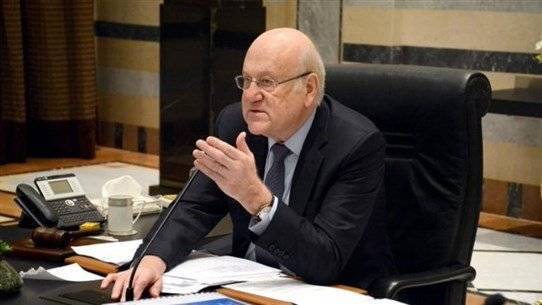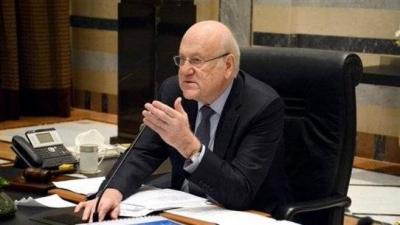Despite the overwhelming frustrated convictions that there will be no decrees for a new government to replace the caretaker government after the end of President Michel Aoun's term, the opportunity has not been completely closed yet. In six days, the country will enter the last ten days of his presidency. There is no constitutional significance to these days after Parliament Speaker Nabih Berri utilized his powers under Article 73 to call for election sessions, setting the first date for September 29 and the second for October 13. Thus, the last ten days, which are not binding for a formal meeting of the Parliament, will be ordinary days that are expected to witness a disappointing third date for elections on Thursday, October 20, which will not occur before the presidential vacancy begins.
The political importance, however, lies in the last ten days as the only opportunity to risk issuing decrees for a new government, which would then need to put an end to the ongoing delay among the parties involved in its formation. What should result from the continued mutual finger-pointing and the tossing of stubborn conditions, and consequently the inability to form a new government alongside the insistence on not electing a president, is simply a short journey to an aggravation of constitutional crises and internal divisions that provide no respite. Aside from all this, the first short path leads to the actual transfer of presidential powers to the caretaker government, which will have to manage the upcoming uncertain phase amidst the stalled agreement on electing Aoun's successor.
There is no constitutional obstacle to this inevitable and binding transfer; however, the political ramifications are certainly more severe. Only one Lebanese party will not recognize the transfer of presidential powers to the caretaker government and may try, as much as it can, to exert pressure on its upcoming role from within the Parliament or through public demonstrations to affirm its challenge to the legitimacy of that assumption of powers. Nevertheless, the caretaker government assuming the president's powers will be met with public recognition from all local parties and treated as a fait accompli. Likewise, both the Arab and Western communities will approach their relationship with it as such. It represents the temporary and transitional constitutional legitimacy of the Lebanese state until a president is elected, and consequently will be subject to negotiation.
The outcome, albeit in a diminished form tainted by its caretaker status, will ensure that the reality, expressed in terms of legitimacy, will be responsible for what lies ahead and provide it with political cover. Only two parties do not want a government with new decrees even until the current president's term ends, for different reasons, yet they converge on the target: caretaker Prime Minister Najib Mikati and the head of the Free Patriotic Movement, Gebran Bassil, benefiting from the excess power granted to him in transforming into an indirect negotiator since the President, his uncle, will ultimately sign the new government's decrees. This is the last constitutional act the president will undertake.
Mikati's approach to the impasse is easier and likely serves his interests no matter how things end up: he will remain Prime Minister, whether under a caretaker role or bolstered by new decrees, and he will become the voice of transitional constitutional legitimacy domestically and abroad. This is what his predecessors, Presidents Fouad Siniora and Tammam Salam, did in 2007 and 2014. The binding signature of Aoun required for the new government to see the light is coupled with another additional and binding signature from its head, making both constitutional authorities balanced in using each as a double-edged sword. However, such a connection, on the verge of the president's term ending, becomes less effective in light of the new reality that will emerge in a few days, which is that there will be a departing head of state and a head of government assuming the powers in his name.
In recent days, despite the accompanying pessimism from the cessation of communications and serious efforts regarding finding an exit from the governmental impasse, there has been some information circulating about "fears" connected to "suspicion" within Hezbollah. The information suggests that the party has not lost the last opportunity that allows it to impose a revival of the caretaker government with new decrees, balancing between what is demanded by both the Presidents of the Republic and the Government and at least lowering their conditions. The party is not expected to abandon the presidency in the final days of the term and to record its loss by imposing a fait accompli of the caretaker government remaining under its head’s conditions, benefiting from the factor of time. Even though the president will leave his office, Bassil, at the head of his bloc, will remain at the core of the political equation represented by Hezbollah as its backbone. He will therefore be concerned with protecting the gains of his ally, the Free Patriotic Movement, and ensuring them, thus allowing him to - or freeing him, in the best case - engage in the entanglement that has accompanied the past six years between two indispensable allies, albeit not at the same level: the President of the Republic and the Parliament Speaker.
There are at least two reasons rooted in the party's concerns that have brought, and continue to bring, its Secretary General Hassan Nasrallah to insist on forming a new government every time he addresses his audience: the first is his concern regarding what is perceived as "extravagances" by Mikati in his foreign relations, and the second is the way he currently manages the affairs since the government was considered resigned last May. The party fears that Mikati will establish a precedent in his performance as a caretaker government while assuming the powers of the President. The content of performance, which his predecessors did not undertake in a similar experience, indicates that he runs the executive authority in a fragmented manner. He settles for holding meetings with his ministers, each separately, without necessitating a Cabinet meeting. Consequently, indirectly, with technocrat ministers from whom most are complained about, he monopolizes constitutional legitimacy, isolating himself from the Cabinet which, according to Article 62, is tasked with the transfer of powers to him in a proxy capacity.




